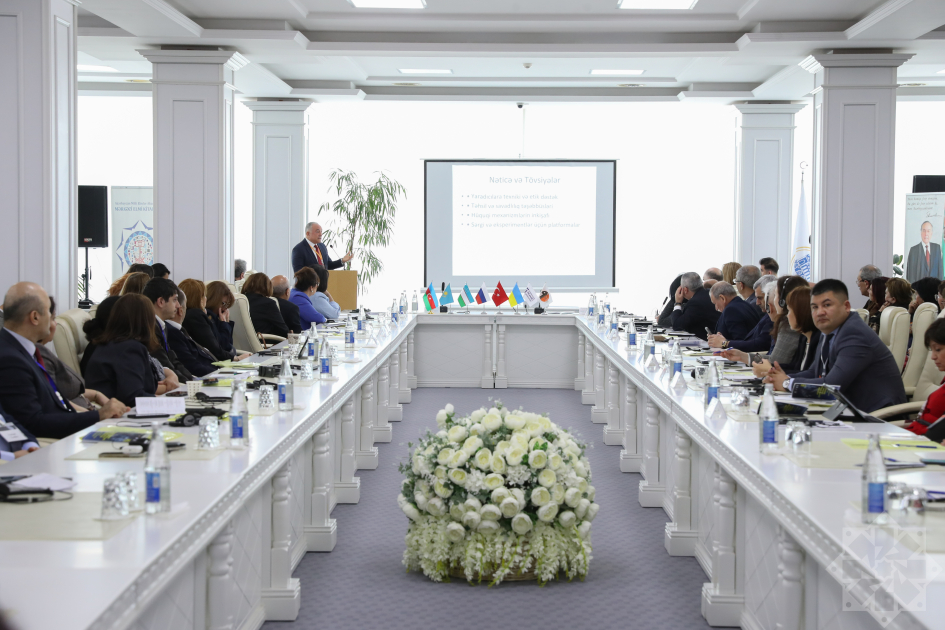
On April 11, Azerbaijan hosted its first international scientific-theoretical conference on the topic "Artificial Intelligence in the Contemporary Art Space: Problems and Prospects". The conference was organized by the Azerbaijan State University of Culture and Arts, with support from the Institute of Information Technologies and Azerbaijan Technical University.
The event began with the playing of the National Anthem of the Republic of Azerbaijan, marking the significance of the occasion. Opening the conference, Professor Jeyran Mahmudova, Rector of AZMIU, highlighted the increasing national focus on artificial intelligence (AI) technologies. She noted that, as per the Decree of President Ilham Aliyev issued on March 19, 2025, the "Artificial Intelligence Strategy of the Republic of Azerbaijan for 2025–2028" had been officially approved, setting forth key objectives for the country's development in this field.
In his speech, Isa Habibbeyli, President of the Azerbaijan National Academy of Sciences, emphasized the transformative impact of AI on various sectors of society. He stated that artificial intelligence is constantly evolving, influencing all aspects of human life and society:
“There is no area of human activity where the effects of artificial intelligence are not being felt. This is a challenge of our time, and it is incumbent upon every country and institution to address it. The recent decrees signed by President Ilham Aliyev underscore the importance Azerbaijan places on AI and its future development.”
Habibbeyli further outlined the work being done by Azerbaijan National Academy of Sciences in applying AI technologies and emphasized the importance of integrating international best practices in the field.
Academician Rasim Alguliyev, Director General of the Institute of Information Technologies at the Ministry of Science and Education, addressed the broader use of AI across various industries. He noted that AI technologies are now pervasive, especially in state digital technologies and industrial
processes.
However, Alguliyev pointed out the unique challenges associated with applying AI in the realms of culture and art. He explained that, unlike other fields where mathematical modeling and system construction are more straightforward, the integration of AI into creative sectors is far more complex: “While AI has proven to be an invaluable tool in many industries, its application in the arts has raised both exciting opportunities and ethical concerns. The artistic process is inherently creative, and blending AI technologies with this creativity presents unique challenges.”
Professor Vilayat Valiyev, Rector of Azerbaijan Technical University, also addressed the conference, stressing the rapid development of technological processes in Azerbaijan. He spoke about the university's efforts to align educational and research programs with contemporary technological advancements. He emphasized the need for universities and research institutes to collaborate in advancing fields like infocommunications, AI, control systems, information security, and aerospace systems. “We must foster collaboration between institutions to conduct groundbreaking research and develop innovative models for the future,” Vilayat Valiyev stated.
The conference featured a presentation of a video clip created using AI technology, showcasing the growing influence of AI in creative fields.
During the plenary session, leading scientists and researchers from Russia, Georgia, Kazakhstan, Uzbekistan, Turkey, Northern Cyprus, and Azerbaijan shared their insights. In addition to in-person attendees, many participants also joined the conference virtually. The event continued with several focused section meetings, addressing topics such as "Practical Applications of AI Tools," "A Vision of the Future with AI," and "Socio-Humanitarian Aspects of AI Use."
In these sessions, approximately 70 researchers from universities across Azerbaijan and abroad presented their findings on the use of AI in various sectors, from healthcare and education to culture and social sciences.